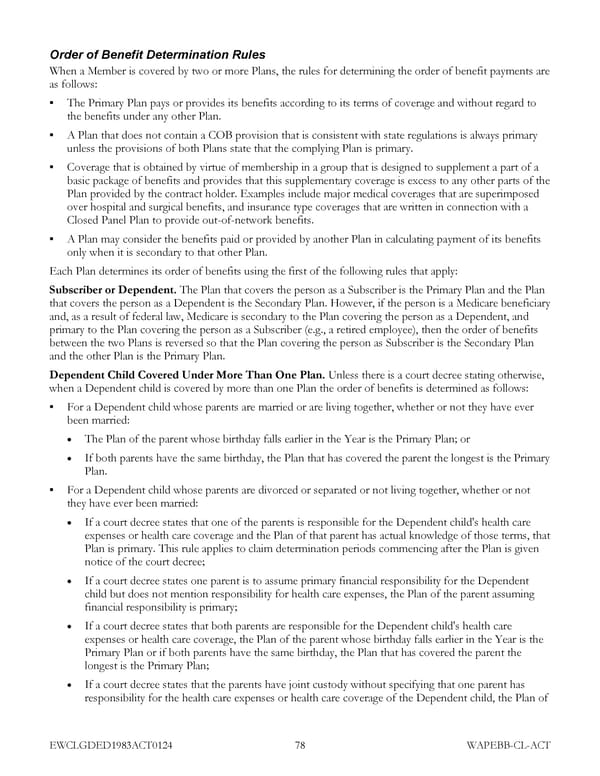Order of Benefit Determination Rules When a Member is covered by two or more Plans, the rules for determining the order of benefit payments are as follows: The Primary Plan pays or provides its benefits according to its terms of coverage and without regard to the benefits under any other Plan. A Plan that does not contain a COB provision that is consistent with state regulations is always primary unless the provisions of both Plans state that the complying Plan is primary. Coverage that is obtained by virtue of membership in a group that is designed to supplement a part of a basic package of benefits and provides that this supplementary coverage is excess to any other parts of the Plan provided by the contract holder. Examples include major medical coverages that are superimposed over hospital and surgical benefits, and insurance type coverages that are written in connection with a Closed Panel Plan to provide out-of-network benefits. A Plan may consider the benefits paid or provided by another Plan in calculating payment of its benefits only when it is secondary to that other Plan. Each Plan determines its order of benefits using the first of the following rules that apply: Subscriber or Dependent. The Plan that covers the person as a Subscriber is the Primary Plan and the Plan that covers the person as a Dependent is the Secondary Plan. However, if the person is a Medicare beneficiary and, as a result of federal law, Medicare is secondary to the Plan covering the person as a Dependent, and primary to the Plan covering the person as a Subscriber (e.g., a retired employee), then the order of benefits between the two Plans is reversed so that the Plan covering the person as Subscriber is the Secondary Plan and the other Plan is the Primary Plan. Dependent Child Covered Under More Than One Plan. Unless there is a court decree stating otherwise, when a Dependent child is covered by more than one Plan the order of benefits is determined as follows: For a Dependent child whose parents are married or are living together, whether or not they have ever been married: • The Plan of the parent whose birthday falls earlier in the Year is the Primary Plan; or • If both parents have the same birthday, the Plan that has covered the parent the longest is the Primary Plan. For a Dependent child whose parents are divorced or separated or not living together, whether or not they have ever been married: • If a court decree states that one of the parents is responsible for the Dependent child's health care expenses or health care coverage and the Plan of that parent has actual knowledge of those terms, that Plan is primary. This rule applies to claim determination periods commencing after the Plan is given notice of the court decree; • If a court decree states one parent is to assume primary financial responsibility for the Dependent child but does not mention responsibility for health care expenses, the Plan of the parent assuming financial responsibility is primary; • If a court decree states that both parents are responsible for the Dependent child's health care expenses or health care coverage, the Plan of the parent whose birthday falls earlier in the Year is the Primary Plan or if both parents have the same birthday, the Plan that has covered the parent the longest is the Primary Plan; • If a court decree states that the parents have joint custody without specifying that one parent has responsibility for the health care expenses or health care coverage of the Dependent child, the Plan of EWCLGDED1983ACT0124 78 WAPEBB-CL-ACT
 Kaiser Permanente NW Classic EOC (2024) Page 84 Page 86
Kaiser Permanente NW Classic EOC (2024) Page 84 Page 86